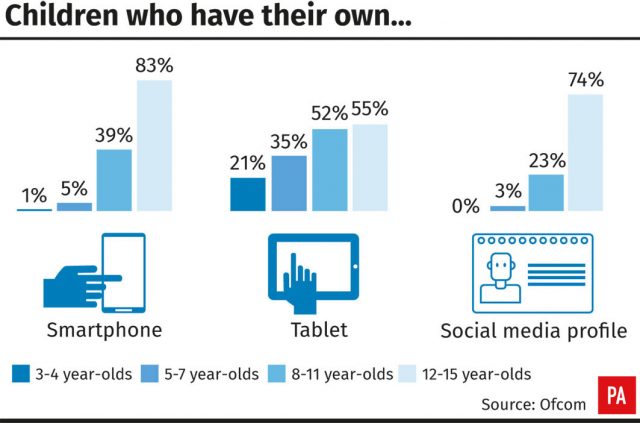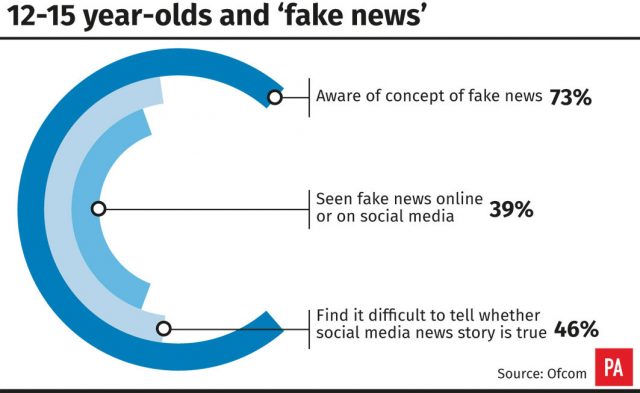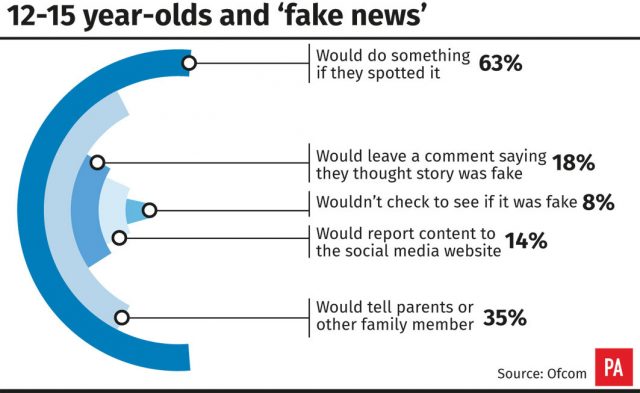
Older children are increasingly wise to fake news on social media and almost all make an attempt to check the truth of a story, according to a report.
Ofcom found 54% of 12 to 15-year-olds use social media platforms such as Facebook and Twitter as news sources, leaving themselves open to disreputable organisations.
More children are using the internet than ever before, with 92% of five to 15-year-olds now online, up from 87% last year.
 (PA Graphics)
(PA Graphics)
More than half of preschoolers (53%) used the internet this year, as did 79% of five to seven year olds, a year-on-year increase of 12 percentage points for both groups.
Much of the growth is driven by the increased use of tablets.
Among older children, YouTube is the most recognised content brand with 94% of 12 to 15-year-olds having have heard of it, compared to 89% for ITV, 87% for Netflix and 82% for BBC One and Two. Some 81% of children of all ages regularly use YouTube to watch short clips or programmes.
The findings come just days after YouTube was widely criticised for failing to prevent predatory comments and accounts from targeting children, which led to several big brands including Mars and Adidas pulling advertising from the site.
Despite their increasing use of social media to access the news, many children are wise to the risks, with just 32% of those who say social media is one of their top news sources believing that the stories are always, or mostly, reported truthfully, Ofcom found.
 (PA Graphics)
(PA Graphics)
Nearly three-quarters of older children (73%) are aware of the concept of “fake news” – 39% say they have seen a fake news story online or on social media.
The regulator’s Children and Parents Media Use and Attitudes Report 86% of 12 to 15-year-olds say they would make at least one practical attempt to check whether a social media news story is true or false, such as looking for it elsewhere, reading comments to verify its authenticity, checking the organisation behind it or assessing the professional quality of the article.
However almost half of older children (46%) say they find it difficult to tell whether a social media news story is true.
Emily Keaney, head of children’s research at Ofcom, said: “Most older children now use social media to access news, so it’s vitally important they can take time to evaluate what they read, particularly as it isn’t always easy to tell fact from fiction.
“It’s reassuring that almost all children now say they have strategies for checking whether a social media news story is true or false. There may be two reasons behind this: lower trust in news shared through social media, but the digital generation are also becoming savvy online.”
 (PA Graphics)
(PA Graphics)
The study found that children’s social media preferences have shifted dramatically, with the number of older children who say Facebook is their main social media profile dropping to 40% from 66% in 2014.
In contrast, Snapchat has rapidly grown in popularity, with the number of older children naming it as their main profile jumping from 3% in 2014 to 32% this year.
More than a quarter of 10-year-olds (28%) have a social media profile, rising to around half of children aged 11 or 12 .
The proportion of older children who have seen hateful content online has increased from 34% last year to 45%.
Ofcom’s survey also found that 35% of eight to 11-year-olds who watch TV say that not enough programmes show children that look like them, while 41% of older children say that too few programmes show children living in their part of the country.
The regulator has announced a review of children’s content in light of the findings, and will publish its report and any proposed regulatory measures in summer next year.


Why are you making commenting on The Herald only available to subscribers?
It should have been a safe space for informed debate, somewhere for readers to discuss issues around the biggest stories of the day, but all too often the below the line comments on most websites have become bogged down by off-topic discussions and abuse.
heraldscotland.com is tackling this problem by allowing only subscribers to comment.
We are doing this to improve the experience for our loyal readers and we believe it will reduce the ability of trolls and troublemakers, who occasionally find their way onto our site, to abuse our journalists and readers. We also hope it will help the comments section fulfil its promise as a part of Scotland's conversation with itself.
We are lucky at The Herald. We are read by an informed, educated readership who can add their knowledge and insights to our stories.
That is invaluable.
We are making the subscriber-only change to support our valued readers, who tell us they don't want the site cluttered up with irrelevant comments, untruths and abuse.
In the past, the journalist’s job was to collect and distribute information to the audience. Technology means that readers can shape a discussion. We look forward to hearing from you on heraldscotland.com
Comments & Moderation
Readers’ comments: You are personally liable for the content of any comments you upload to this website, so please act responsibly. We do not pre-moderate or monitor readers’ comments appearing on our websites, but we do post-moderate in response to complaints we receive or otherwise when a potential problem comes to our attention. You can make a complaint by using the ‘report this post’ link . We may then apply our discretion under the user terms to amend or delete comments.
Post moderation is undertaken full-time 9am-6pm on weekdays, and on a part-time basis outwith those hours.
Read the rules hereLast Updated:
Report this comment Cancel